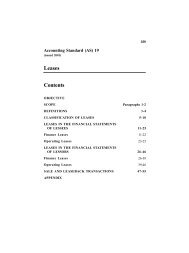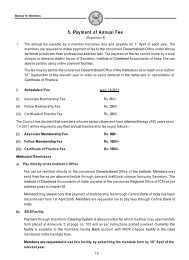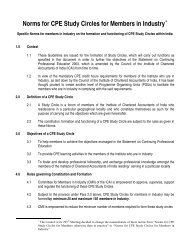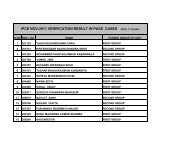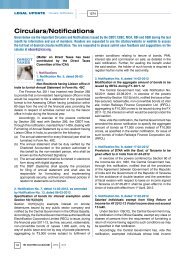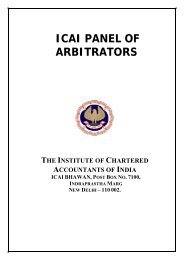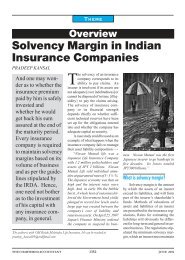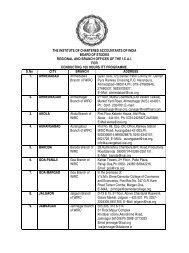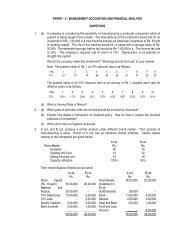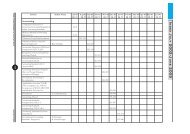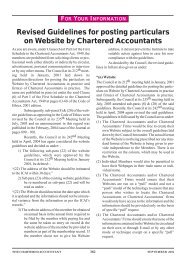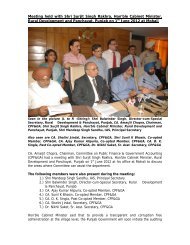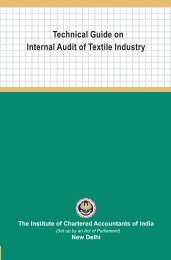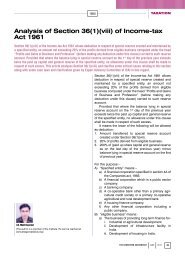The Chartered Accountant
The Chartered Accountant
The Chartered Accountant
Create successful ePaper yourself
Turn your PDF publications into a flip-book with our unique Google optimized e-Paper software.
Entities<br />
A35. In the case of audits of smaller<br />
entities, the auditor may communicate<br />
in a less structured manner with those<br />
charged with governance than in the<br />
case of listed or larger entities.<br />
Communication with Management<br />
A36. Many matters may be discussed<br />
with management in the ordinary<br />
course of an audit, including matters<br />
required by this SA to be communicated<br />
with those charged with governance.<br />
Such discussions recognise<br />
management’s executive responsibility<br />
for the conduct of the entity’s operations<br />
and, in particular, management’s<br />
responsibility for the preparation of<br />
the financial statements.<br />
A37. Before communicating matters<br />
with those charged with governance,<br />
the auditor may discuss them with<br />
management, unless that is inappropriate.<br />
For example, it may not be<br />
appropriate to discuss questions of<br />
management’s competence or integrity<br />
with management. In addition to<br />
recognising management’s executive<br />
responsibility, these initial discussions<br />
may clarify facts and issues, and give<br />
management an opportunity to provide<br />
further information and explanations.<br />
Similarly, when the entity has<br />
an internal audit function, the auditor<br />
may discuss matters with the internal<br />
auditor before communicating with<br />
those charged with governance.<br />
Communication with Third Parties<br />
A38. Those charged with governance<br />
may wish to provide third parties, for<br />
example, bankers or certain regulatory<br />
authorities, with copies of a written<br />
communication from the auditor. In<br />
some cases, disclosure to third parties<br />
may be illegal or otherwise inappropriate.<br />
When a written communication<br />
prepared for those charged with governance<br />
is provided to third parties, it<br />
may be important in the circumstances<br />
that the third parties be informed<br />
that the communication was not prepared<br />
with them in mind, for example,<br />
by stating in written communications<br />
with those charged with governance:<br />
a) That the communication has<br />
DECEMBER 2008 1098 THE CHARTERED ACCOUNTANT<br />
STANDARDS<br />
been prepared for the sole use<br />
of those charged with governance<br />
and, where applicable,<br />
the group management and the<br />
group auditor, should not be relied<br />
upon by third parties;<br />
(b) That no responsibility is assumed<br />
by the auditor to third<br />
parties; and<br />
(c) Any restrictions on disclosure<br />
or distribution to third parties.<br />
A39. <strong>The</strong> auditor may be required by<br />
laws or regulations to, for example:<br />
l Notify a regulatory or enforcement<br />
body of certain matters<br />
communicated with those<br />
charged with governance. <strong>The</strong><br />
auditor has a duty to report<br />
misstatements to authorities<br />
where management and those<br />
charged with governance fail to<br />
take corrective action;<br />
l Submit copies of certain reports<br />
prepared for those charged with<br />
governance to relevant regulatory<br />
or funding bodies, or other<br />
bodies such as Central Government<br />
in the case of some public<br />
sector undertakings; or<br />
l Make reports prepared for<br />
those charged with governance<br />
publicly available.<br />
A40. Unless required by laws or regulations<br />
to provide a third party with<br />
a copy of the auditor’s written communications<br />
with those charged with<br />
governance, the auditor may need the<br />
prior consent of those charged with<br />
governance before doing so.<br />
Forms of Communication (Ref:<br />
Para. 15-16)<br />
A41. Effective communication may<br />
involve structured presentations and<br />
written reports as well as less structured<br />
communications, including discussions.<br />
<strong>The</strong> auditor may communicate<br />
matters other than those identified<br />
in paragraphs 15 and 16 either orally<br />
or in writing. Written communications<br />
may include an engagement letter that<br />
is provided to those charged with governance.<br />
A42. In addition to the significance<br />
of a particular matter, the form of<br />
communication (e.g., whether to<br />
communicate orally or in writing, the<br />
extent of detail or summarisation in<br />
the communication, and whether to<br />
communicate in a structured or unstructured<br />
manner) may be affected<br />
by such factors as:<br />
l Whether the matter has been<br />
satisfactorily resolved.<br />
l Whether management has previously<br />
communicated the matter.<br />
l <strong>The</strong> size, operating structure,<br />
control environment, and legal<br />
structure of the entity.<br />
l In the case of an audit of special<br />
purpose financial statements,<br />
whether the auditor also audits<br />
the entity’s general purpose financial<br />
statements.<br />
l Legal requirements. In some<br />
jurisdictions, a written communication<br />
with those charged<br />
with governance is required in a<br />
prescribed form by local law.<br />
l <strong>The</strong> expectations of those<br />
charged with governance, including<br />
arrangements made for<br />
periodic meetings or communications<br />
with the auditor.<br />
l <strong>The</strong> amount of ongoing contact<br />
and dialogue the auditor<br />
has with those charged with<br />
governance.<br />
l Whether there have been significant<br />
changes in the membership<br />
of a governing body.<br />
A43. When a significant matter is discussed<br />
with an individual member of<br />
those charged with governance, for<br />
example, the chair of an audit committee,<br />
it may be appropriate for the<br />
auditor to summarise the matter in<br />
later communications so that all of<br />
those charged with governance have<br />
full and balanced information.<br />
Timing of Communications (Ref:<br />
Para. 17)<br />
A44. <strong>The</strong> appropriate timing for



